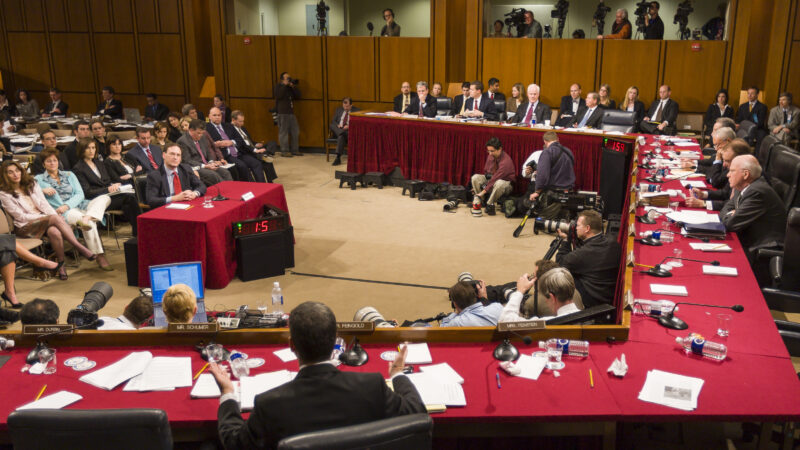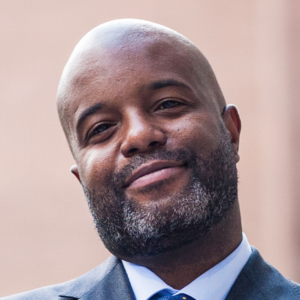Punishing Corporate Expression: Distinguishing the Abuse of Government Power from Politics as Usual
- September 15, 2023

Introduction
Leaders of businesses large and small have long been a source of influence in American democracy, joining other constituencies that include civic groups and the media as checks on government power. In exercising that role, it is not uncommon for business leaders to take positions on public policy or social issues, often as a way to reflect the views of employees and shareholders or to communicate values to their customers.
In today’s highly polarized environment, however, weighing in on public policy or social issues can come with a heightened political risk: being singled out and retaliated against by government officials in response. While Governor Ron DeSantis’ series of attacks on the Walt Disney Company for opposing Florida’s “Don’t Say Gay” law is a high-profile example, the governor is not alone in adopting this approach. Across the country, officials at all levels of government are increasingly attempting to use the coercive powers of the state to target private companies for real or perceived expression of viewpoints. This tactic is not novel, but its frequency and intensity accelerated under the Trump Administration and has become a regular feature of the current political environment.
It is not unusual for businesses and political leaders to disagree about issues of policy or the appropriate role of government in regulating industry. Nor is it inappropriate for government officials to comment on the business practices of specific industries or individual companies. Corporations may decide, for example, that they will only contribute to candidates for public office who hold certain political positions. Likewise, government leaders may openly criticize a CEO’s expressed viewpoints. In a free society, these expressions of views are fair game.
What crosses a line, however, is when government officials attempt to use the power of the state to punish individual businesses for lawfully expressing viewpoints with which the official disagrees. Retaliation of this kind is an abuse of power and a common authoritarian tactic used to weaken the role businesses can play as a check on government power. Absent pushback, a sustained use of these tactics can intimidate businesses, chill corporate innovation, and distort markets.
Beyond a gut-level sense, however, it can be challenging to discern and articulate the difference between political sparring that is fair game in a democratic society and abuses of governmental power. To that end, this brief aims to better equip business leaders to identify when actual or threatened government action in response to corporate expression crosses the line.
Exercises of Government PowerExercises of Government Power
Abuses of government power can take different forms, because government officials wield the power of the state in many ways. They employ rhetoric to influence a public debate, deploy administrative and agency power to gatekeep opportunities and launch investigations, and propose and pass laws that codify the rules of the game.
Although the levers of government power aren’t necessarily equivalent in the harm they can inflict, identifying categories of government action helps illustrate the ways power can be abused. These include:
- Rhetorical Threats: In response to a company’s (or company leader’s) disfavored speech or expression, a high-ranking government official may threaten that the government will take action to punish the company or make a statement directly intended to chill business expression. For example, in March 2021, Senator Elizabeth Warren (D-MA) tweeted that she would work to “break up Big Tech,” in response to critical tweets from Amazon about the senator’s characterization of the company’s tax liability. That same year, Senator Mitch McConnell (R-KY) warned businesses that they would face “serious consequences” for speaking out against a new voting rights law in Georgia and urged corporate America to “stay out of politics.”
- Administrative Tools: A government official may propose using the executive branch’s administrative or investigative power in retaliation for viewpoints it opposes. For example, in March 2023 California Governor Gavin Newsom announced that his state would refuse to renew a contract with Walgreens over its decision to halt sales of the abortion pill mifepristone. While Walgreens characterized its decision as risk management rather than political speech, Newsom’s threat (later walked back) illustrates the way officials can employ the tools of state to sanction perceived speech
- Legislative Power: A lawmaker may propose legislation or initiate an investigation directly targeting a company as a result of its expressed views. For example, in 2018 the Georgia legislature voted to strip out from a larger bill a proposed tax exemption on jet fuel, originally intended to benefit Delta Airlines, in retaliation for the company’s decision to eliminate a promotional discount for National Rifle Association members following the school shooting in Parkland, Florida.
A Framework for Recognizing Abuses of Power
Even with a grounding in how government power may be exercised, how can businesses determine when a specific action is an abuse of power?
To assist in navigating that fraught space, we propose four questions that businesses should ask to help make sense of this environment. While none of these factors is necessarily decisive on its own, taking the factors together can help businesses weigh the extent to which a government actor is attempting to abuse the powers of their office.
⇨ Is the government action intended to further a legitimate public policy purpose, or is it meant to punish speech or expression?
In assessing an actual or threatened action against a business, companies should consider whether the political leader is using (or threatening to use) government power in pursuit of a legitimate public policy purpose, or whether the action constitutes retaliation for disfavored speech or expression. For example, it is within norms for a U.S. Senator to say something like, “If this company violated federal law by trying to interfere with the right of workers to organize, the National Labor Relations Board should investigate.” Likewise, it would not be unusual for a president to announce that his administration will prioritize federal grants to businesses that commit to paying their workers a living wage. By contrast, a governor would cross a line if she decided that because a company lobbied against her proposal to raise penalties for labor violations, she will disqualify that company from competing for state contracts. It would also be unacceptable for a presidential administration to decide to blacklist businesses that donated to a political opponent. The former are examples of public officials using government power to advance public policy goals without regard to a company’s viewpoint or political affiliation; the latter are abuses of power because they are meant to punish a company for lawfully expressing a particular viewpoint.
In practice, the line between punishing a company for its speech and taking action to further a public policy goal can get murky. For example, in 2012 a number of Democratic mayors and city officials announced they would prevent the expansion of the fast food giant Chick-fil-A into their cities after the company president expressed personal opposition to same-sex marriage. This type of threat, in direct response to protected speech, arguably crosses the line. But consider, for example, if the Chick-fil-A president’s views had the effect of encouraging or ratifying unlawful discrimination against employees or customers. In that case, a public official would be within their rights to suggest the government investigate any credible allegations and consider non-compliance with anti-discrimination laws when making government permitting or licensing decisions, as allowed under the law.
⇨ Given their position and authority, can the official make good on the threatened government action?
Businesses should also weigh the nature of threatened government action in relation to the specific powers of the office held or sought by the political leader and barriers to effectuating the threat. To what extent does their specific office have the authority to make good on the threat? For example, a state legislator saying that the government should cancel a federal small business contract with a business that supported Pride Week would carry different weight if instead threatened by the head of the Small Business Administration or the president. And the rhetoric of the president or a governor can be particularly impactful, even on its own: President Trump’s relentless attacks on Amazon, based on his misdirected frustration with critical coverage from the Washington Post, caused the company’s stock price to tumble.
Businesses should also consider what guardrails exist between the official and the proposed action. For example, some public officials face greater structural or procedural challenges to advancing specific policies – for example, U.S. senators needing to overcome a filibuster in order to pass legislation – than others who, for example, serve in executive agency roles. Threats of retaliation should be appropriately weighed in that context.
⇨ Is the actual or threatened government action targeted at an individual company, or is it applicable to a broader industry or business community with diverse views?
Companies should also weigh whether the government action targets an individual business or identifiable group of businesses, or if it more broadly applies to an entire industry or the business community writ large. For example, legislatures routinely consider whether to create, maintain, or withdraw certain government benefits to incentivize corporate behavior that would further overarching public policy goals, like creating a tax deduction to encourage clean energy development. That type of use of power stands in contrast to a decision to remove a benefit that primarily accrues to a single company or narrow section of industry in response to its actual or perceived viewpoints.
In a similar vein, businesses should also be on the lookout for thinly-veiled efforts to regulate a so-called “industry” (for example, “Big Tech” or “the media”) that are effectively meant to target a small number of companies’ perceived political leanings. Businesses should also consider that government officials sometimes propose facially-neutral policies that in practice actually target a single company or narrow slice of industry, as with the Florida legislature’s effort to target Disney’s monorail system through seemingly innocuous language.
⇨ What is the overall context within which the government official is taking or threatening action? Is it part of a pattern of behavior aimed at silencing dissent?
Businesses should also consider the context within which a governmental abuse of power is levied. How does the government official describe their actions? Are the actions part of a pattern of retaliation against companies or other entities who express disfavored viewpoints? For example, in July 2023 Governor DeSantis directed the Florida state pension manager to consider legal action against Anheuser-Busch InBev, which he claimed had “breached legal duties owed to shareholders” by entering into a minor partnership with a transgender influencer that generated public controversy and may have caused the company’s revenue to fall. While a pension fund manager might have a fiduciary responsibility to take into account an individual company’s falling stock prices regardless of the cause, DeSantis’s request was clearly just the latest example of the governor’s far-reaching campaign to target so-called “woke” corporations and to weaponize government power, including prior use of the state pension fund, to further an agenda to punish opposing viewpoints.
The Bottom LineThe Bottom Line
Why does understanding these distinctions matter? Because using government power to quash dissenting views is a key tactic used by political leaders looking to consolidate or aggrandize their own power and is an indicator of democratic decline. When trained on a single company or narrow slice of industry, punishing businesses for expressing viewpoints can have significant and chilling effects on customers, employees, other businesses, and local economies, undermining the role business can play in a healthy democratic society. Left unchecked, this type of retaliatory behavior can create a permission structure for others in power to do the same, fostering corruption, cronyism, and regulatory uncertainty that destabilize business climates and undermine free markets.
Better understanding when exercises of government power cross the line can serve as a first step toward helping the business community understand and navigate this challenging environment and, when appropriate, push back against abuses of power.
Recommended ReadingRecommended Reading
Galston, William and Elaine Kamarck. Is Democracy Failing and Putting Our Economic System at Risk? Brookings Institution, January 2022.
Henderson, Rebecca. The Business Case for Saving Democracy. Harvard Business Review, March 2020.
Kleinfeld, Rachel. How Does Business Fare Under Populism? Carnegie Endowment for International Peace, June 2023.
Mizruchi, Mark. Democracy or autocracy? American business needs to choose. Niskanen Center, June 2022.
Related Content
Join Us.
Building a stronger, more resilient democracy is possible, but we can’t do it alone. Become part of the fight today.
Donate
Sign Up for Updates Sign Up for Updates
Explore Careers Explore Careers
How to Protect Democracy How to Protect Democracy





